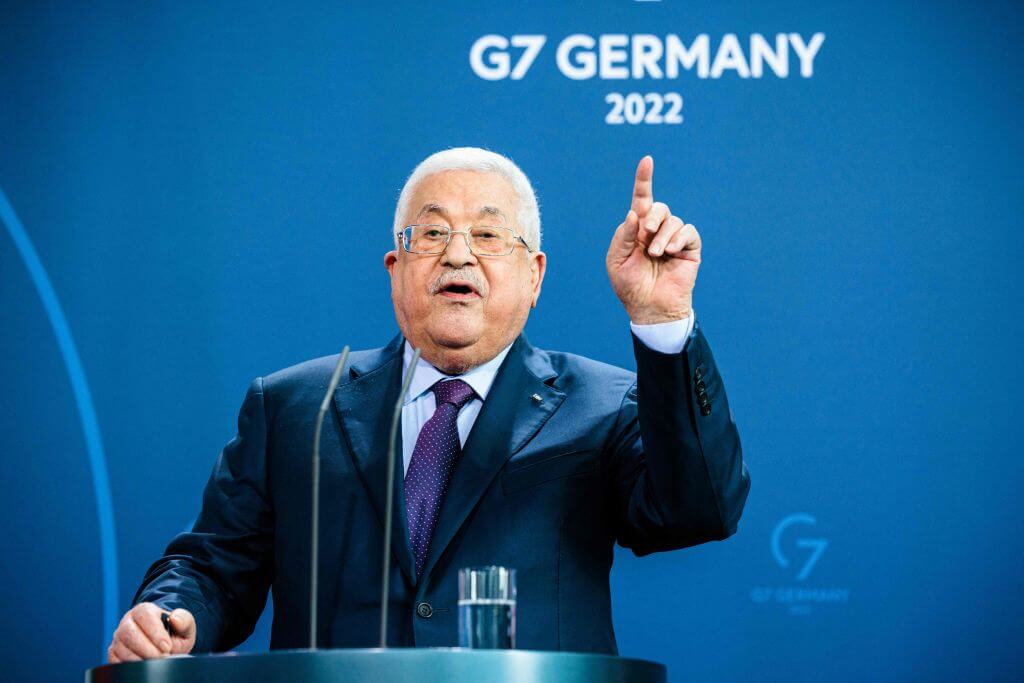Palestinian president walks back ‘50 Holocausts’ accusation after drawing worldwide ire
U.S. antisemitism envoy, German chancellor, Israeli PM strongly rebuke Mahmoud Abbas a day after he accused Israel of ‘50 Holocausts’ against Palestinians

Palestinian President Mahmoud Abbas speaks at a press conference in Berlin on Aug. 16, 2022. Photo by Getty Images
This article originally appeared on Haaretz, and was reprinted here with permission. Sign up here to get Haaretz’s free Daily Brief newsletter delivered to your inbox.
Palestinian President Mahmoud Abbas walked back on his comments blaming Israel for committing “50 Holocausts” against Palestinians on Wednesday, after drawing international ire.
According to the Palestinian Wafa news agency, Abbas reaffirmed that the Holocaust is the “most heinous crime in modern human history,” emphasizing that his remarks were not meant to deny the Holocaust, strongly denouncing it.
Earlier, Defense Minister Benny Gantz’s office demanded that Abbas walk back on his comments.
On Tuesday, while speaking alongside German Chancellor Olaf Scholz, Abbas was asked if he, as the Palestinian leader, planned to apologize to Israel and Germany for the Munich massacre committed by Palestinian militants against 11 Israeli Olympic athletes ahead of the 50th anniversary next month. Abbas responded instead by citing allegations of atrocities committed by Israel since 1947.
“Israel has committed 50 massacres in 50 Palestinian locations since 1947, he said, adding: “50 massacres, 50 Holocausts.”
Palestinian President, Mahmoud Abbas, visits Germany and called Israel 'apartheid'.
— Hananya Naftali (@HananyaNaftali) August 16, 2022
The German Chancellor, Olaf Scholz, immediately REJECTED his lies and REFUSED to accept this term.
Thank you Germany for standing with Israel. ???? pic.twitter.com/haN9eGTJjl
Rebukes of his comments poured in on Wednesday, joining those of Israeli Prime Minister Yair Lapid who said Abbas’ remarks about “50 Holocausts,” made on German soil, were “not only a moral disgrace, but a monstrous lie.”
Mahmoud Abbas accusing Israel of having committed "50 Holocausts" while standing on German soil is not only a moral disgrace, but a monstrous lie.
— יאיר לפיד - Yair Lapid (@yairlapid) August 16, 2022
Six million Jews were murdered in the Holocaust, including one and a half million Jewish children.
History will never forgive him.
The U.S. antisemitism envoy Deborah Lipstadt condemned Abbas’ remarks, saying that “Holocaust distortion can have dangerous consequences and fuels antisemitism.”
A day after Abbas’ accusations, German chancellor Scholz condemned the claims, tweeting he was “disgusted by outrageous remarks made by Palestinian President Mahmoud Abbas.”
While Scholz did not immediately rebuke Abbas for using the term “Holocaust,” he rejected the Palestinian leader’s description of Israel’s treatment of Palestinians as “apartheid.” Scholz also said he did not believe the time had come to recognize Palestinian statehood, which Abbas repeatedly called for.
Scholz’s spokesperson Steffen Hebestreit declared the news conference over immediately after Abbas’ answer, which had been previously announced as the last question.
“For us Germans in particular, any relativization of the Holocaust is intolerable and unacceptable,” Scholz later told the German tabloid Bild.
Defense Minister Benny Gantz said that Abbas’ statement are “vile and untrue”, calling it an attempt to “distort and rewrite history.” He went on to say it is “Holocaust denial” to draw comparisons between the Israeli military and Nazi Germany.
Yad Vashem Chairman Dani Dayan called Abbas’ comments “disgustingly low” and urged the German government to “respond appropriately to the insults uttered within the chancellor’s office.”
The Palestinian Ministry of Foreign Affairs released a statement claiming that Lapid’s condemnation of Abbas is “an attempt to protect the false narrative that Israel is trying to market in order to deceive the world” regarding the Israeli-Palestinian conflict.
“It proves that the occupying state has no desire to apologize for the crimes committed by the Zionist gangs against the Palestinian people,” it said. “The denial by Lapid and other Israeli leaders of the historical injustice against the Palestinian people continues and show the lack of a vision for peace that will lead to historical reconciliation and recognition of the legitimate national rights of the Palestinian people and the establishment of a Palestinian state according to the decisions of the international community,” the Palestinian Ministry of Foreign Affairs added.
The Palestinian president did say on Tuesday he was committed to building trust and achieving a peaceful solution to the conflict with Israel.
“Please come to peace,” he said. “Please come to security, let’s build trust between us and you. This is better than other kinds of talking.”
Weeks before a planned somber commemoration marking the 50th anniversary of the Munich attack, Germany has also found itself embroiled in controversy in its dealings with the relatives of the Israelis who were killed.
Victims’ families announced last week that they planned to boycott the ceremony after failing to reach agreement on bigger compensation from the German government.
Relatives of the athletes have long accused Germany of failing to secure the Olympic Village, refusing Israeli help and botching a rescue operation in which five of the attackers also died.

















